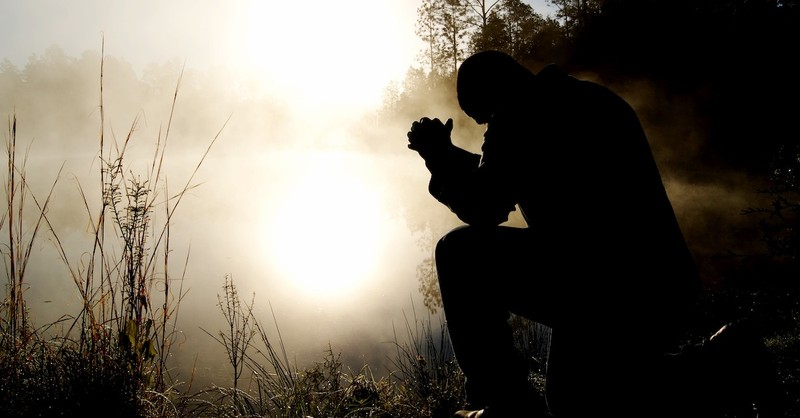
Lately, on so many fronts, feelings of helplessness pervades our lives. We feel like there's nowhere to turn; like we're stuck between a rock and a hard place; like there's nothing else for us to do and we are all out of solutions. There's a weariness that accompanies this helplessness. You're tired. So tired you can feel it in your bones. You just want whatever it is to be over. You want to quit. You're spent. Like a wet dishrag, you're wrung dry.
My Dad has a saying he quotes when he feels this way. With resignation, he'll say, "What God doesn't hinder he allows." This statement acknowledges the difficulty of his situation but also his feeling of helplessness, like there's nothing else he can do but throw his hands up in despair. But this statement also limits God, for it is not entirely true. Helplessness makes us rationalize our feelings while placing limits on God.
The Lord knows all of our emotions and is acquainted with them (Hebrews 4:15). In the Garden of Gethsemane, Jesus felt helpless with overwhelming sadness and anguish (Matthew 26:36-46), but at the end of it all, he did his Father's will. We can learn from him so that even though we feel helpless, we can do our Father's will. The same way we learn to be helpless, let's learn to be hopeful.
Helplessness is a feeling, not place we choose to go. Here are 10 helpful reminders for why God allows us to feel this way.
Photo Credit: © Ava Sol/Unsplash

1. A Changed Perspective
When we feel helpless, we remember his promises. We recognize that He is our source (John 14:6); that He loves us (John 3:16), that He will never forsake us (Deuteronomy 31:6); that He strengthens us (Psalms 27); that he provides wisdom (Proverbs 4:1). In our deepest distress, we recall his goodness to us and realize that we are not abandoned. We remember that he died for us and has become our salvation. He saved us when He died for us, and will keep us until the end.
Photo Credit: © Unsplash

2. Earnest Prayer
Our prayers become more honest, more heart-wrenching, more desperate when we feel helpless. Before King Jehoshaphat started to praise, he prayed. He was so fearful that he sought the Lord with prayer and fasting. Before Jacob reconciled with Esau, he desperately cried out to God. He prayed for escape (Genesis 32:9-12). When Jacob prayed, we see all his fear and his weakness. He remembered God's promises to him, acknowledging that he had to go through the valley of his meeting with Esau to get to God's promise for him.
He humbled himself in his fear, because he was not worthy of God's steadfast love and faithfulness. When Jacob fled those many years ago, he had nothing. In time, he had plenty, and he attributed it all to God's steadfast love and faithfulness to him. When the time came to meet his brother, Jacob begged for deliverance from Esau’s threats from many years ago, unless God intervened.
Desperation removes the layers from our hearts and forces us to pray as if our lives depended on it, because our lives depend on it.
Photo Credit: © Getty Images/Anastasiia Stiahailo

3. Praise
When we remember who God is, we praise Him. Praise changes our perspective; we focus on the Problem Solver instead of our problems. We start to look up instead of around. As our perspective shifts our hope is renewed. If we praise God when we're feeling helpless, it is a sacrifice of praise that pleases Him (Hebrews 13:15). When King Jehoshaphat was in a pickle, he started to praise God, and God made his enemies flee (2 Chronicles 20:21-22). So, praise Him!
Photo Credit: © Daniel Reche/Pixabay

4. Humility
As we become more earnest, we are humbled. We're feeling helpless because there's nothing we can do. Helplessness strips us of our pride. We are stripped down to the essence of who we are. There is a recognition that we are nothing. From dust we came, and to dust we return. Only God can shape this dust and use it for his glory. We are humbled, not helpless, for he gives more grace to those who humble themselves (Luke 14:11).
Photo Credit: © Unsplash/Aaron Burden

5. Persistence
After twelve years of suffering, the lady with the issue of blood was desperate for healing (Mark 5:24-34). In her helplessness, she recognized who Jesus was. Though she had no business mingling with the crowds, she found Jesus in the crowd that day and touched the hem of his garment. This woman probably tried every remedy and consulted with doctors for many years with no recourse. She was helpless but hopeful when she touched the hem of his garment. This time finally, she was made whole. When we feel powerless, we can persist, and find that helplessness drives us to new life and healing in Christ.
Photo Credit: © Getty Images/Aaron Amat

6. Strength
In our helplessness, we feel weak, useless, defeated. But as we shift the focus off of our capabilities, we recall that in our weakness, he is made strong. Paul had a thorn in the flesh that he prayed to be removed. Instead, God made it clear to him that the thorn would stay, but "my grace is sufficient for you, for my power is made perfect in weakness” (2 Corinthians 12:9). When we feel helpless, we must remember, we are not powerless.
Photo Credit: © Getty Images/Robin Skjoldborg

7. Provision
When King Jehoshaphat felt helpless he prayed. As he prayed he recalled the attributes of God, his faithfulness, and his provision. God heard his prayer and used Jehoshaphat to defeat his enemies. Jesus' provision in the Garden was to go to the cross and die for us. Though Jesus acknowledged his anguish, he moved past his feelings to fulfilling his Father’s will. God's provision may not be what we anticipate, but even when we feel helpless, He is providing for us in whatever way He sees fit. God provides (Psalms 37:25).
Photo Credit: © Pexels/Ray Piedra

8. Patience
We do gain patience as we wait on God in our helplessness. For as we wait, our strength is renewed (Isaiah 40:31). We wait with our focus on Him; we wait expectantly; we wait and pray. We wait until we know we should act. We see that patience builds character. Paul says it like this: "And not only so, but we glory in tribulations also: knowing that tribulation worketh patience; and patience, experience; and experience, hope” (Romans 5:3-4 KJV). Our waiting is not in vain.
Photo Credit: © Pexels/JÉSHOOTS

9. Increased Faith and Trust
We feel helpless, but we're not powerless. God hears our desperate prayers, and as we pray, he imparts wisdom for strategy, the courage to act; grace for our speech; direction for our hands and feet. Ultimately as we trust Him (Proverbs 3:5,6), our faith becomes more durable. In our helplessness, we get to know God more.
Photo Credit: © iStock/Getty Images Plus/FlairImages

10. Sovereignty
The miracles, the response, how He chooses to work through us is up to Him. Our part is to acknowledge His role, His power. Our part is to hear his voice and obey, to trust him and obey. When we realize that He is truly in control of all our circumstances and that His ways are beyond understanding, we lean on Him more for everything we need. This is the ultimate lesson in our helplessness—God is in control; He's always working even in ways we don't understand.
Unfortunately, it seems we only become more spiritual when we feel helpless, becoming keenly aware of our limitations. We often feel helpless because so much is unknown, and we see clearly how much is out of our control. However, only God controls the timing, for our times are in His hands (Psalms 31:15). With Him, we learn how to deal with our helplessness. As we lean on Him, may our helplessness turn to hopefulness because he is with us, he strengthens us, and he is faithful.
Photo Credit: © Guillaume de Germain/Unsplash
Originally published Thursday, 21 May 2020.









